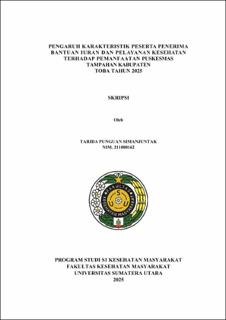| dc.description.abstract | The National Health Insurance (JKN) is a program that aims to fulfill the rights of the community to access various health services. JKN participants are categorized into two groups: Contribution Assistance Recipients (PBI) participants and Non-Contribution Assistance Recipients (non-PBI) participants. The majority of people in the Tampahan Community Health Center (Puskesmas) service area are PBI participants. However, the utilization of health services at the Tampahan Puskesmas remains low, particularly among the PBI group. This study employs an analytical survey research design with a cross-sectional study design. The sampling technique used simple random sampling, with a sample size of 100 participants. Data collection was conducted through interviews using a questionnaire administered directly to registered PBI participants residing in the service area of the Tampahan Health Center. The collected data were analyzed through univariate, bivariate, and multivariate stages using the chi-square test (p<0.05) and multiple logistic regression test (p<0.05). The study results indicate that there is a relationship between knowledge, attitude, perception, health condition, accessibility, health facilities, health worker services, and information regarding the utilization of the health center. Multivariate analysis revealed that there is an influence between perception (p=0.004), accessibility (p=0.002), health facilities (p=0.010), and health worker services (p=0.017) on the utilization of the health center by PBI participants. Therefore, it is recommended that community health centers optimize counseling and education related to the JKN program, promote the health services provided by community health centers, and improve the quality of health services for the community. | en_US |


